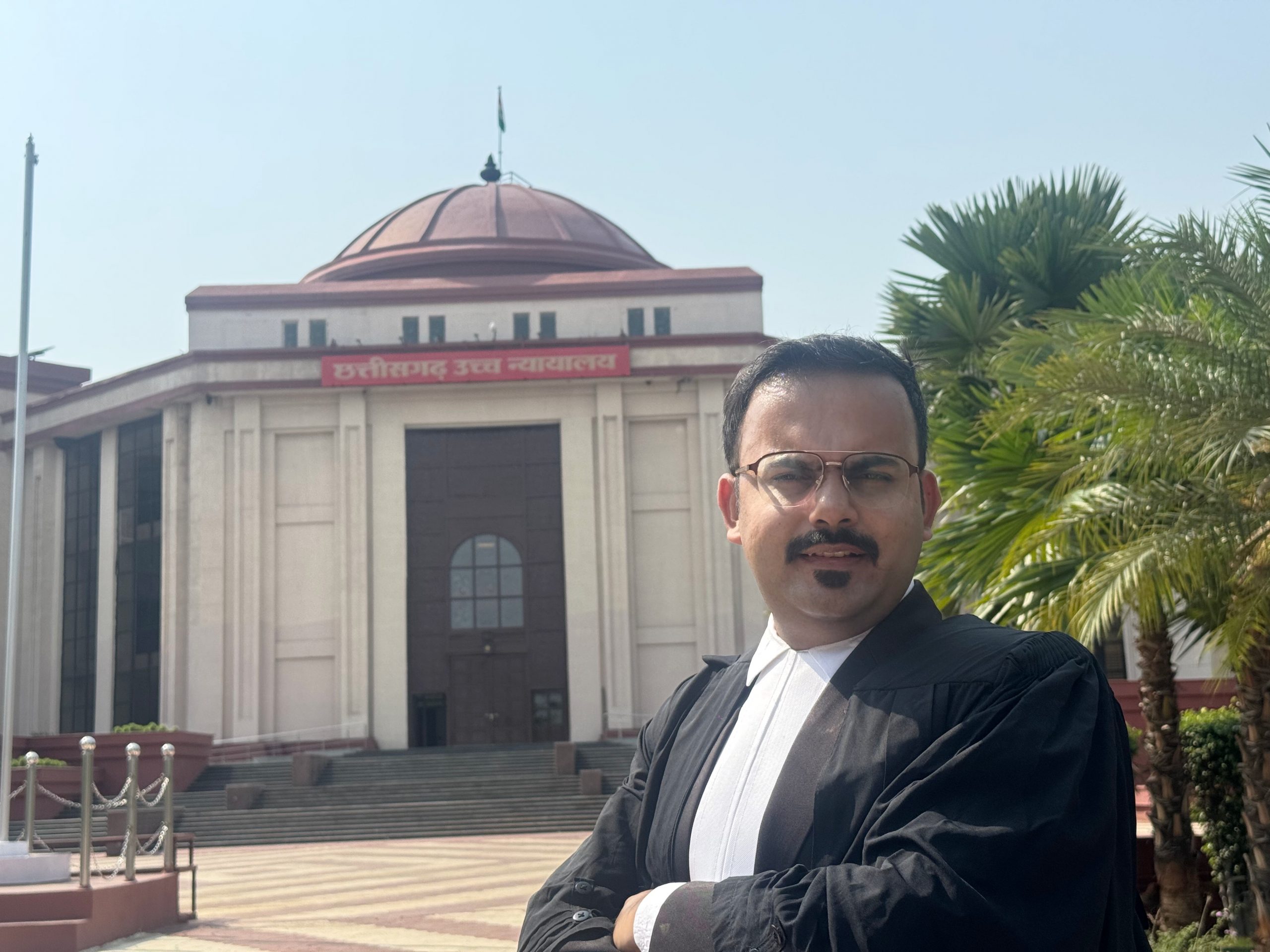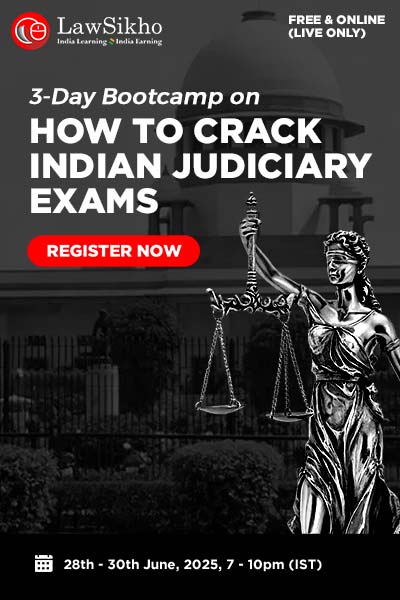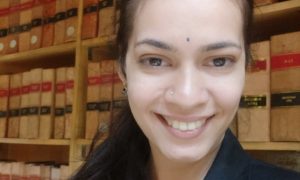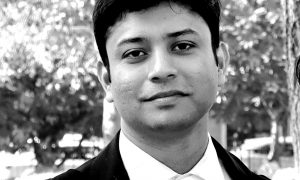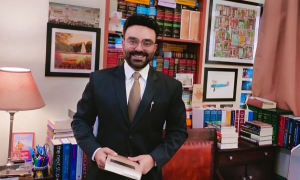This interview has been published by Anshi Mudgal and The SuperLawyer Team
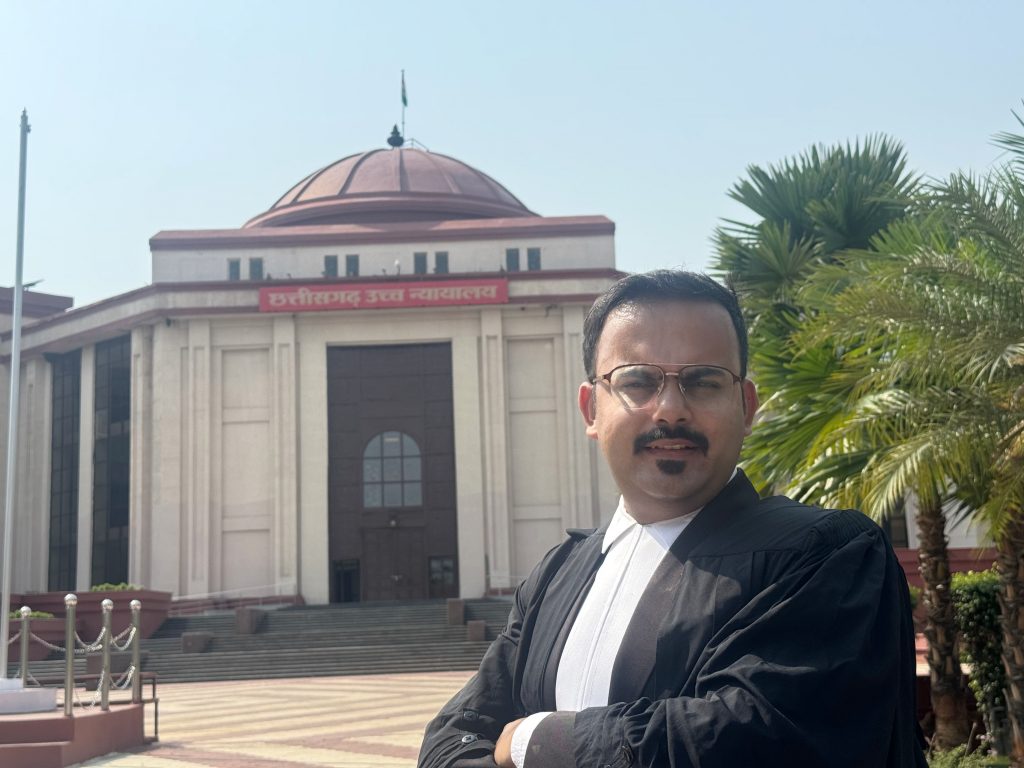
Having achieved consistent success in your career as an Advocate-on-Record, what initially inspired you to pursue a career in law? Was there a particular factor or event that led you to choose this field?
I am eternally grateful to the team of Superlawyer for having me over. I truly appreciate their endeavor in providing a gridline which is constantly transmitting and distributing incredible experiences of the legal professionals generated during their journey from struggle to success.
Now coming to this question, landing myself in the field of law was more of a compulsion than choice as I never took interest in science or mathematics. I, though, pursued commerce in 10+2 but then at that juncture I didn’t see myself enjoying a career in the field of commerce down the line. Being born and brought up in a small town of Chhattisgarh i.e., Baloda Bazar, we were exposed to limited career options as available now so the sector that remained within my periphery was humanities.
Ultimately, the option boiled down to law for two reasons. One is my father is practicing law in the District and Session Court at Baloda Bazar so I have grown up around the musty smell of files, and with gossip regarding bar and bench at the dinner table which I feel that subconsciously pushed me into this field of law. Another reason is that I was into debating during my school days, and in the year 2012, a movement led by Mr. Anna Hazare for Lokpal Bill had caught the limelight all around. While researching on those topics, I was enjoying watching the parliamentary debate by the titans of the bar i.e., Late Mr. Arun Jaitley, Dr. AM Singhvi to name a few. Their art of persuasion was mesmerizing to that extent that my conscience at that fag end of teenage swept me in this field without much introspection or analysis.
During the early stages of your career, you interned with several lawyers and worked on research papers covering topics like IPR and Arbitration. How did these internships and research experiences shape your understanding of the law, and in what ways did they contribute to your professional growth?
In this regard, I convey my sincere thanks to my alma mater ILS Law College, Pune. The rich legacy and alumni network that our college holds, facilitated me to attract the bundle of skillful internships. Further, its faculty and the vast library played a vital role in developing our legal acumen. At that juncture, we were suggested by the seniors to intern with the Non-Governmental Organizations in the 1st year then at the District and Sessions Court in the 2nd and 3rd Year followed by the internship at the Constitutional Court or a law firm in the 4th and 5th year. Following that path, it gave me an idea as to where my passion lies, and provided me a short glimpse of practical exposure as to how law learned in the classroom unfolds in the courts.
In so far as research experience is concerned, we were fortunate enough to be guided by few of the country’s best legal minds who were also serving or served as a member of Law Commission of India or International Law Commission or were authors of the classical commentaries on law of contract, administrative law etc. Their lessons helped me in understanding the fundamental jurisprudence and interpretation of law.
After gaining experience working with renowned law firms in an Associate capacity, handling arbitration, litigation, and court appearances, you transitioned to independent practice as an Advocate/Counsel before the High Court of Chhattisgarh. What motivated this shift, and what cultural differences did you observe between working at firms and practicing independently?
The shift was motivated by the following quote which I read somewhere while commuting from my accommodation to office in Mumbai Local ie. “If you don’t design your own life plan, chances are you’ll fall into someone else’s plan. And guess what they have planned for you? Not much.”
Another motivation was the grandeur of counsel practice that I observed in the original side of Bombay High Court during my stint with the law firm Naik Naik and Co., Mumbai. The uniqueness, integrity and ethics that I discovered in the Bombay Bar was par excellence.
With specific reference to the cultural difference, I would say that working at a law firm is essential for a young law professional because the law firms create a base for litigation and imbibes discipline. By being in direct touch with the client, an associate or fresh law graduate gets first-hand experience of litigation as to how correspondences are built between the parties to strengthen their cases in the dispute. Once the dispute is ripened for resolution in the Court or Tribunal then the independent advocates are engaged to put forth the submission especially in Tier 1 city.
Another major cultural difference is the receipt of a fixed amount at the end of every month while working with the law firm. People who support this route justifies that law students who are paying a hefty sum for their legal education these days are entitled to work with firms while learning the foundation of this profession, however those who oppose say that fixed pay check at the end of month kills the desire to learn law. I favor the former over the latter in the current scenario as there are a majority of lawyers who go brief less for very long duration while going independent and at the same time, they are discharging their obligation towards educational loans. Such circumstances develop severe frustration as it makes survival very hard for young lawyers.
Your tenure at VSA Legal, particularly in drafting and arguing Special Leave Petitions and Writ Petitions before the Supreme Court of India, has been impactful. How has this experience shaped your approach to dispute resolution and regulatory practice, especially in landmark cases like the Chhattisgarh reservation case and the invalidation of the tricycle tender process?
Credit for that impact goes to those three partners cum mentors of VSA Legal. While observing the dogged and clever advocacy of Mr. Sumeer Sodhi, ingrained with in-depth scholarly knowledge and incessant painstaking effort of Mr. Aman Nandrajog while preparing for arguments and industrial ingenuity of Mr. Varun Tankha gave me courage to handle high stakes litigation independently without any fear and prejudice.
Starting your own practice is a significant leap. What were your thoughts and motivations behind taking this step, and what challenges did you face in the initial stages of setting up your independent practice?
The onset of Covid 19 from 2020-2022 was a major blow to my plan of going independent. It brought a lot of confusion with regards to place and area of practice to commence. I introspected a lot and researched on the market where I found the dearth of advocate-on-record in the Supreme Court of India to represent the accused facing financial crunch or litigant in the tier-3 or tier 4 cities. Without any trial, the accused are languishing in jail for years by giving up after the refusal of their application for release on bail before the High Court. The helplessness of a plethora of government employees facing termination or litigants losing their land without any cause are hesitating to approach the Supreme Court of India owing to high costs and travelling expenses. In view thereof, I decided to put my efforts to qualify for the Advocate on Record Examination, and serve the needful in these areas to the best of my ability.
Waiting for work was the biggest challenge I faced post establishing my office in Bilaspur, Chhattisgarh. The local briefing counsel wasn’t able to muster the courage to engage me as I was barely 5 years into the practice, however, time, humanity and hard work became the best healer to overcome that challenge.
Clearing the Advocate-on-Record (AOR) examination is a major milestone. What aspects of the AOR exam did you find most challenging, and what strategies did you use to prepare effectively for this prestigious qualification? Additionally, how has the AOR designation influenced your professional practice?
Indeed, it is a major milestone. During preparation, the reading of entire 64 landmark cases (now 86) was although worthwhile but cumbersome, and during appearance, the preparation of 4-5 drafts in the limited time of 4 hours was a tedious task.
I made my notes by analyzing the previous year’s question papers and referring to the latest law on it. I also divided my schedule for 2 months’ preparation as per the subjects. I diligently attended the lectures conducted by the exam cell as well as the Supreme Court Advocate on Record Association. Focusing on the drafting during my training, and assisting the clerk in filing documents or curing defects provided clarity in the procedure which is generally tested in the practice and procedure paper.
Being the only AoR qualified from Chhattisgarh this year brought me closer to some leading practitioners in the State as well as from my previous place of work i.e., Mumbai who are bestowing their valuable trust upon me to represent their clients before the Supreme Court of India.
Throughout your distinguished career, maintaining a healthy work-life balance must have been essential. What strategies have you employed to achieve this, and what advice would you offer to others looking to balance their professional ambitions with personal commitments?
Realization of the importance of work-life balance came to me when I got admitted in the hospital for a treatment of mosquito bitten disease which severely affected my body due to low immunity. Though achieving perfect work-life balance is far cry in our profession, doing pranayam, kriyas and yogas with a balanced diet helped me tremendously in getting my house in order. Another concern which I am trying to resolve these days is excessive screen time which sometimes causes brain fog or affects memory power. I would just advice that the first wealth is health followed by the immediate family. It is therefore, spare 2-3 hours for the health and family along with a minimum 6 hours’ sleep to rejuvenate yourself.
With your extensive experience across various areas of law, your advice would be invaluable to aspiring legal professionals. What guidance would you offer to students aspiring to build a successful legal career? Are there particular resources or strategies you would recommend for them?
- Mentorship: Law is very similar to life as it throws a lot of surprises which may not be in good taste many times. To tackle or navigate in a journey, one must always find a mentor who can unselfishly hold your hands. I am always indebted to my encouraging mentors in the profession i.e., Ms. Manisha Karia, Senior Advocate, Supreme Court of India, Managing Partners and former colleagues at Naik Naik and Co. including but not limited to Mr. Ameet Naik, Mr. Abhishek Kale, Mr. Avdhoot Prabhu and Ms. Swati Singh for showing me light at the end of the tunnel.
- Drafting and reading skill: Whether its corporate or litigation, one must shed its toil, tears and sweat at the initial days of career in improving their drafting skills. I am grateful to my mentors who suggested me to spend some time in Bombay for learning this invaluable skill as some of the country’s best draftsman are sitting there. Another important aspect is cultivating the reading skills from first year in the law schools especially the concepts such as property, crime and punishment, democracy etc. which has been borrowed into our system from the foreign land.
- Discipline and Ethics: are the values that is vanishing into thin air in the profession. Touts, corruption in the judiciary, nepotism etc are putting negative impact. Without taking much care about such professional evils, one must always be truthful to himself/herself by following seven lamps of advocacy crystallized by Edward Abbott Parry. Whenever feeling low, take out and read some autobiography of the giants in the profession which will make you realized that you are not alone to struggle in this road to success.
- Law is a jealous mistress – Lastly, success in the profession demands a lot of sacrifice. To keep yourself going on in the journey, one must remember the quote by John Scott i.e., To succeed as a lawyer, a man must work like a horse and live like a hermit.
Last but not least my advice to our law aspirant is embodied in the locus classicus of poem “If” by Rudyard Kipling i.e.
If you can dream—and not make dreams your master;
If you can think—and not make thoughts your aim;
If you can trust yourself when all men doubt you,
But make allowance for their doubting too;
If you can wait and not be tired by waiting,
Yours is the Earth and everything that’s in it,
And—which is more—you’ll be a Man, my son!
Get in touch with Devashish Tiwari –

